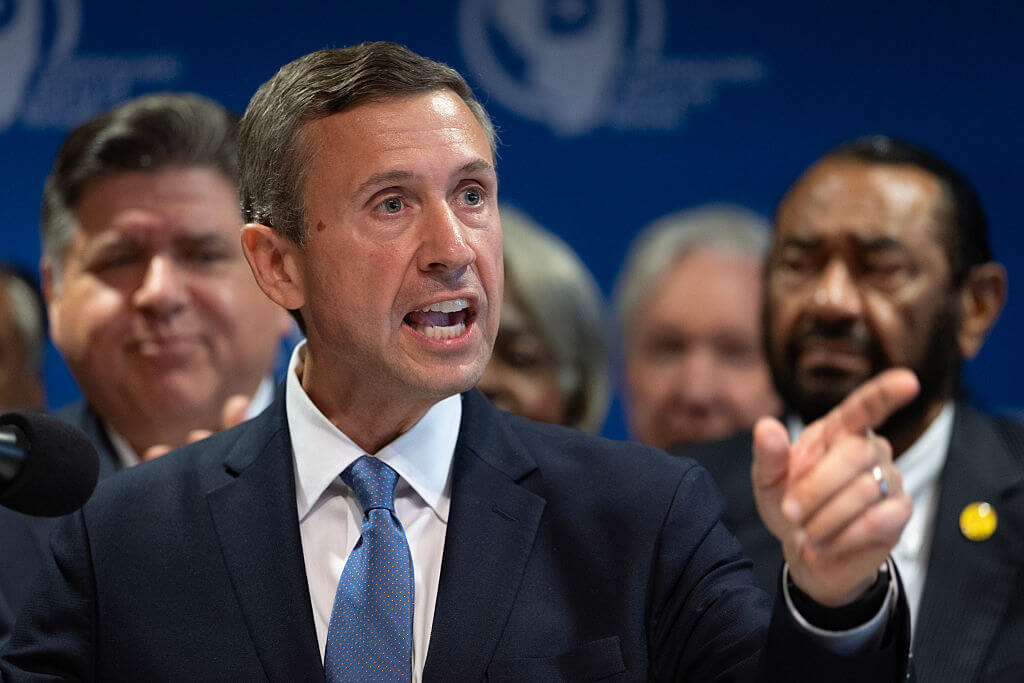Democrats withdraw two-state resolution to avoid clash with progressives on Israel and Palestinians
The DNC decision comes amid growing influence of younger activists and progressives pushing a tougher line on Israel

Ken Martin, chairman of the Democratic National Committee, on Aug. 05. Photo by Scott Olson/Getty Images
The Democratic National Committee withdrew a resolution reaffirming the party’s support for Israel and a two-state solution to avoid a clash with younger and progressive activists pressing for a tougher, more pro-Palestinian stance.
The backtracking signals how deeply pro-Palestinian views have become entrenched in the party. Just a year ago, the DNC barred a Palestinian-American representative from speaking on the main stage at the national convention, a decision that drew protests and criticism.
“This is a moment that calls for shared dialogue,” DNC chair Ken Martin told delegates today at the party’s summer meeting in Minneapolis after announcing the decision to pull his own resolution. “We have to find a path forward as a party, and we have to stay unified.”
His remarks came at the close of a resolutions committee meeting that had approved his motion and rejected an alternative resolution calling for an arms embargo on Israel and U.S. support for Palestinian statehood at the United Nations.
The votes underscored how the party’s approach to Israel has shifted amid rising concern over civilian casualties and the dire humanitarian situation in Gaza.
Last month, a record 27 Senate Democrats supported a pair of resolutions introduced by Sen. Bernie Sanders, the Jewish Vermont Independent and longtime critic of U.S. aid to Israel, calling for the blocking of weapons transfers to Israel. That vote was followed by sharp criticisms of the Netanyahu government’s conduct by a growing number of mainstream Democrats, including Jewish governors and potential presidential candidates, Josh Shapiro of Pennsylvania and JB Pritzker of Illinois.
Polls show that Democratic voters are increasingly sympathetic to Palestinians. In a recent Quinnipiac survey, just 12% of Democrats sympathize more with Israelis in the Israeli-Palestinian conflict. In June, 56% of voters in the Democratic mayoral primary picked Zohran Mamdani, a democratic socialist with a history of activism targeting Israel, as their nominee. A post-primary survey showed that 78% agreed with his belief that Israel was committing genocide in Gaza, and 79% support restricting weapons to Israel.
Martin’s now-withdrawn resolution called for the secure and unrestricted flow of aid to Gaza, recognized the complexity of the conflict in the Middle East and called for a two-state solution negotiated through direct bilateral negotiations. After a brief discussion on the matter and huddling with a group of DNC members, Martin said he would create a task force comprised of Jewish and Palestinian-American stakeholders to agree on a consensus resolution.
James Zogby, a Palestinian-American DNC committee member who has long advocated for changes to the party’s platform, said he was satisfied with Martin’s decision to pull his resolution.
“I think it was a really smart and good gesture on his part,” he said in an interview. “We are going to continue the conversation without the burden of one side winning and the other side losing. That’s huge progress.”
Zogby regretted, though, that the motion backed by younger progressives failed to pass.
Allison Minnerly, the 26-year-old Florida DNC member who introduced the failed arms embargo measure, said it was “disappointing” that the establishment rejected what she said was the preference of Democratic voters.
She told Politico that the decision to pull the resolution reflected “fears that even the establishment Democratic Party, here at the DNC, is not aligned with the base, and trying to avoid that conversation because it’s already created a problem with the party.”
At the committee meeting, Sophia Dannenberg, a Washington Democratic Party delegate, said she supported Martin’s resolution but urged a stronger and louder statement about protecting Palestinians in Gaza. “I do fear that we’re losing our future as the Democratic Party by not being courageous on this issue,” she said.
Jewish Democrats expressed support for the party’s approach. Halie Soifer, chief executive of the Jewish Democratic Council of America, called it “an important day for the Democratic Party.”
Soifer said she was “surprised” to see the DNC withdraw the resolution from consideration at the official meeting on Wednesday, citing the language that supported an immediate release of the remaining hostages, an increase of humanitarian aid into Gaza and a clear condemnation of the October 7, 2023 attack. However, she said JDCA expects to be part of the DNC task force and is confident that the party “will continue to align with the views and values of the vast majority of Jewish Americans.”
The Democratic Majority for Israel, which was launched in 2019 to counter increasing calls in the party to distance Democrats from Israel, said the committee’s vote on Wednesday sent a “resounding” message that the Democratic Party remains strongly pro-Israel.
“In this critical moment, Democrats stood firm, rejected this dangerous effort, and sent a message that they remain united in our commitment to Israel’s security and our long-standing alliance,” said Brian Romick, DMFI’s president and CEO.
The DNC’s decision to withdraw the resolution — and the divided reactions today’s votes drew — reflect the challenge Democrats face in upcoming elections as they try to represent the full range of views among their members and voters.















